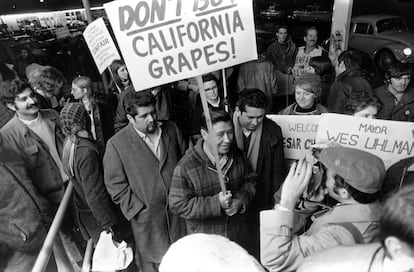Cesar Chavez Day: What’s the history behind it and what does it celebrate
The holiday was proclaimed by president Barack Obama in 2014 and it’s observed on several states

Since 1993, the City of Sacramento, California has recognized Cesar Chavez’s birthday as a City Holiday, celebrating the life and work of the american activist. Reno, Nevada has also celebrated it since 2003. In 2014, Cesar Chavez Day was proclaimed a federal commemorative holiday by then-president Barack Obama, who admired the activist and even adapted the United Farm Workers of America motto, “Si se puede” to the English “Yes we can,” during his 2004 Illinois elections to the U.S. Senate.
Even though Chavez was investigated by the FBI during his life and was attacked by right-wing groups and politicians, he has become an important figure in American history and the labor movement for his tireless efforts to improve the lives of farmworkers and his advocacy for social justice and civil rights. At the start of the presidency of Joe Biden, a bust of Chavez was placed on a table directly behind the Resolute desk in the Oval Office. Cesar Chavez Day has become an important holiday to learn more about workers rights.
Who was Cesar Chavez?
Cesar Chavez (born Cesario Estrada Chavez) was an American farm worker, labor leader and civil rights activist who, with Dolores Huerta, co-founded the National Farm Workers Association (NFWA), today known as the United Farm Workers of America (UFW) labor union, which protects farm workers in the United States.
Born in Yuma, Arizona to a Mexican-American family, he began his life as a manual laborer, before joining the United States Navy. He had a difficult childhood living near poverty, which later influenced his views. After leaving the Navy, he got involved in the Community Service Organization, a civil rights organization, through which he helped laborers (mostly minorities) register to vote throughout the 1960s. He then co-founded the NFWA and El Malcriado, a newspaper published in both English and Spanish that provided a forum for migrant workers to talk about working conditions, and helped organize the farmworkers, who were predominantly Mexican American and Filipino American.
He then began organizing strikes among farm workers who demanded better working conditions. Influenced by Mahatma Gandhi and other revolutionaries, Chavez used nonviolent tactics, such as pickets and boycotts, to pressure farm owners and the government into granting strikers’ demands. Concerned about his work, the FBI monitored him and opened a file on his activities.
What did Cesar Chavez do?
Cesar Chavez dedicated his life to fighting for the rights of farm workers and promoting nonviolent social change. He also advocated for better housing and access to education for these workers and their families. His work raised awareness of the struggles faced by farmworkers and migrant families. He received support from different labor and leftist groups.
In September 1965, Filipino American farmworkers, organized by the Agricultural Workers Organizing Committee (AWOK), started the Delano grape strike against table grape growers in Delano, California, to protest for higher wages and fight against the exploitation of farmworkers. Cesar Chavez and his supporters voted to support them. He organized the picketers, called for donations and invited left-wing activists to join them.
Chavez launched a formal boycott against Schenley Industries and the DiGiorgio Corporation, the two largest corporations which were involved in the Delano grape industry. On August 30, 1968, the DiGiorgio Corporation held an election among its workers, allowing them to choose the union they wanted to represent them.
The grape strike and boycott ended on July 29, 1970, when grape growers signed labor contracts with the UFW, which included timed pay increase, health and other benefits.
The strike increased Chavez’s and the UFW popularity. Contracts between the UFW and grape growers were the first of their kind in agricultural history, and they included an increase in wages, improved working conditions, with some of them including unemployment insurance, paid vacation days and the creation of a special benefits fund. Chavez organized more strikes in favor of laborers throughout his life.
When is Cesar Chavez Day?
Cesar Chavez Day is a US federal commemorative holiday proclaimed by president Barack Obama in 2014. The holiday celebrates the birth and legacy of the civil rights and labor movement activist on March 31, the day Chavez was born.
Ever since 2008, Obama endorsed the idea of creating a national holiday in Chavez’s honor, stating: “Chavez left a legacy as an educator, environmentalist, and a civil rights leader. And his cause lives on. As farm workers and laborers across America continue to struggle for fair treatment and fair wages, we find strength in what Cesar Chavez accomplished so many years ago. And we should honor him for what he’s taught us about making America a stronger, more just, and more prosperous nation. That’s why I support the call to make Cesar Chavez’s birthday a national holiday. It’s time to recognize the contributions of this American icon to the ongoing efforts to perfect our union.” In 2011, as president, he said: “Cesar Chavez’s legacy provides lessons from which all Americans can learn.”
In California, where the holiday has been observed since 1995, state offices and schools are closed on March 31 because of the holiday. States like Arizona, Michigan, Nebraska and New Mexico have celebrations in honor of Chavez.
The holiday seeks to highlight the legacy of Cesar Chavez, focusing on Chicano and Mexican Americans efforts in the labor movement.
Sign up for our weekly newsletter to get more English-language news coverage from EL PAÍS USA Edition










































